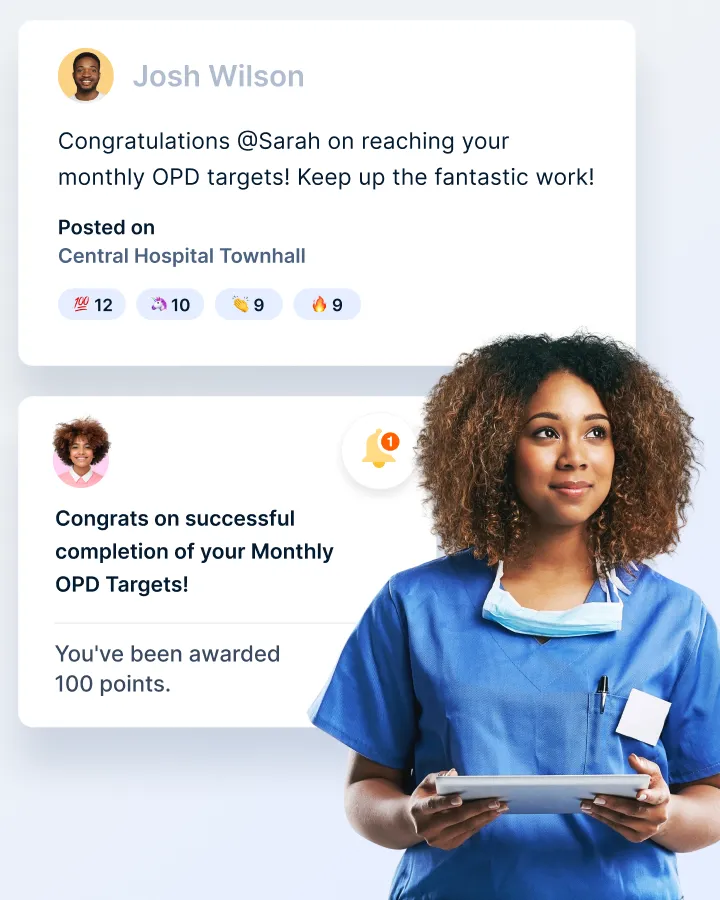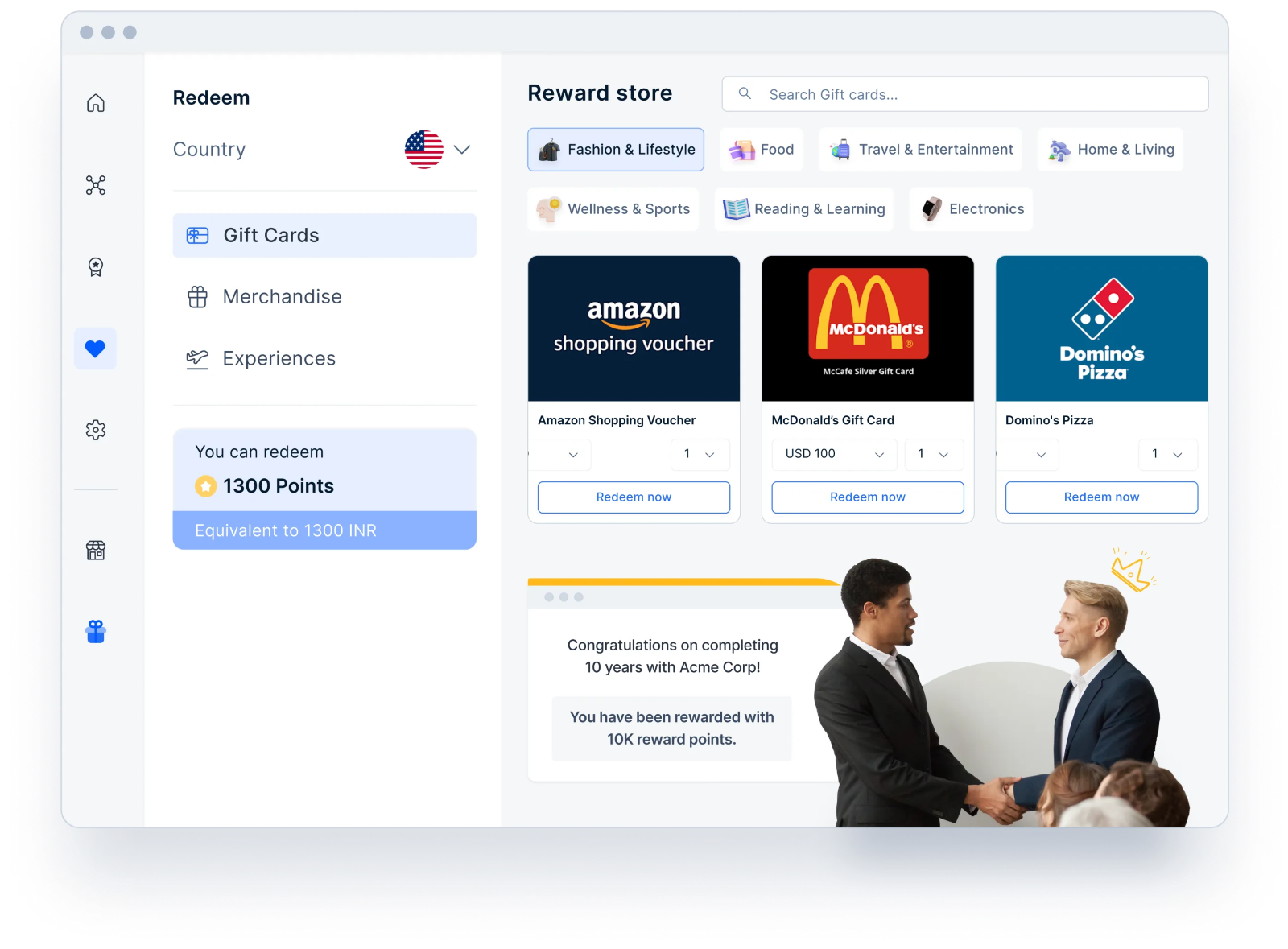The Complete Guide to Nursing Rewards and Recognition: Strategies to Engage, Retain, and Empower Healthcare Heroes
Learn how strategic nursing rewards and recognition programs help healthcare leaders boost morale, reduce turnover, and improve both nurse engagement and patient outcomes.
On this page
- What are nursing rewards and recognition?
- Why nursing rewards and recognition matter in healthcare?
- The challenges nurses face in the healthcare industry and how to deal with them
- Examples of nurse recognition done right
- Strategies to build the right recognition and rewards for nurses
- How to measure the impact of nursing rewards and recognition
- Conclusion
Nursing is one of the most demanding professions, requiring long hours, emotional resilience, and a deep commitment to patient care. Despite their crucial role in the healthcare system, many nurses feel underappreciated and overworked, leading to significant challenges such as burnout and high turnover rates.
In fact, studies show that 47% of nurses consider "more recognition for nurses" as extremely important, highlighting a critical gap in how healthcare institutions acknowledge their contributions. The absence of sufficient recognition not only impacts individual nurses' morale but also affects the broader healthcare system.
Implementing a robust nursing rewards and recognition program is essential for addressing these issues. By fostering a culture of appreciation, healthcare institutions can retain top talent, reduce turnover, and ensure high-quality patient care, ultimately benefiting both nurses and the patients they serve.
What are nursing rewards and recognition?
Nursing rewards and recognition refer to the various methods and programs used to acknowledge and celebrate the hard work, dedication, and impact of nurses in healthcare settings.
These initiatives can range from formal awards and ceremonies to more informal gestures of appreciation, such as thank-you notes, peer recognition programs, or public acknowledgment of a nurse's contributions. The goal is to boost morale, improve job satisfaction, and reinforce a positive work environment by making nurses feel valued for their efforts.
Effective nursing rewards and recognition programs not only highlight individual achievements but also foster a culture of appreciation within the healthcare organization.
By recognizing the essential role that nurses play in patient care and overall healthcare delivery, these programs contribute to higher levels of employee engagement, retention, and performance, ultimately leading to better patient outcomes.
Why nursing rewards and recognition matter in healthcare?
Nursing is one of the most demanding professions. Long shifts, emotional exhaustion, and physical fatigue are part of the job. Nurses work under high stress, often with limited support. They also face communication barriers and struggle with a lack of recognition.
Despite their crucial role, many nurses feel underappreciated. This leads to burnout and high turnover. A growing number of healthcare professionals now highlight the need for more meaningful nurse recognition and appreciation.
According to research, 47% of nurses consider recognition extremely important. This shows a clear gap in how the rewards of nursing are handled in healthcare. So rewarding and recognizing the nurses in the healthcare industry will result in:
1. Boosts morale
Regular recognition can significantly boost nurses' morale, making them feel valued and appreciated for their hard work.
2. Reduces burnout
65.6% of nurses report high levels of job burnout, indicating a widespread issue within the profession. Acknowledging nurses' efforts can help reduce stress and burnout.
3. Improves patient care
Happy and motivated nurses are more likely to provide better patient care, improving overall patient outcomes.
4. Enhances retention
A well-structured rewards and recognition program can reduce turnover rates, saving hospitals and healthcare facilities time and money.
5. Fosters a positive work environment
Recognition fosters a culture of positivity and collaboration, leading to a more harmonious work environment.
The challenges nurses face in the healthcare industry and how to deal with them
Nurses are the backbone of the healthcare system. But despite their dedication, they face several challenges that can affect their well-being and performance.
High stress and burnout
One of the biggest issues is high stress and burnout. Long hours, emotional strain, and fast-paced environments take a toll on physical and mental health. Studies show that burnout can lead to lower morale, reduced engagement, and higher turnover.
Empuls helps alleviate nurse burnout by fostering a culture of appreciation and well-being:
- Personalized recognition: Empuls enables timely and meaningful recognition through peer-to-peer appreciation, spot awards, and milestone celebrations, boosting morale and reducing stress.
- Wellness benefits: The platform offers perks and benefits that prioritize nurses' financial, physical, and mental well-being, such as tax-saving benefits, fringe benefits, and discounts.
- Automated rewards: Empuls automates rewards for various occasions, ensuring that nurses feel valued throughout their career journey, from onboarding to retirement.

Communication barrier
Another challenge is communication barriers. Nurses often coordinate with doctors, specialists, patients, and families. Miscommunication can lead to errors, stress, and frustration, ultimately affecting patient care and satisfaction.
Empuls enhances communication within healthcare organizations, breaking down hierarchical structures:
- Social intranet: The platform's social intranet connects employees, facilitating open and transparent communication across teams and departments.
- Interactive features: Empuls includes features like celebration walls, community groups, and interactive forums, fostering a sense of community and collaboration among nurses.
- Integration with work tools: Empuls integrates seamlessly with tools like Microsoft Teams and Slack, allowing nurses to engage in recognition and communication within their existing workflows.

Lack of recognition
A major issue across healthcare settings is the lack of recognition. Many nurses feel that their hard work goes unnoticed. Without proper acknowledgment, even the most committed professionals can feel discouraged. This directly impacts motivation, productivity, and overall job satisfaction.
Empuls addresses the lack of recognition in the nursing profession by providing structured and meaningful acknowledgment:
- Diverse recognition programs: The platform supports various recognition types, including value badges, spot awards, and peer awards, catering to different achievements and contributions.
- Patient and family feedback: Empuls allows patients and families to recognize exceptional care by scanning a QR code and submitting feedback, which is then shared across the organization to celebrate the nurse's dedication.
- Analytics and insights: Empuls provides analytics on recognition trends, helping leadership understand the impact of recognition programs and identify areas for improvement.

These challenges make it critical to build better support systems for nurses. That’s where Empuls can help. Empuls offers a powerful platform for nursing rewards and recognition that boosts morale and engagement.
Through peer-to-peer recognition, rewards for nurses, and a vibrant social community, Empuls ensures nurses feel seen, appreciated, and connected. For more information on how Empuls can support your nursing staff, Book a demo call with our expert!
Examples of nurse recognition done right
Here are four hospitals in the USA known for their recognition and rewards programs for nurses:
- Brigham and Women's Hospital (Boston, MA): This hospital offers various awards and scholarships to recognize nurses for their outstanding achievements. They emphasize meaningful recognition as part of their professional practice model, ensuring a supportive environment for nurses to thrive.
- University Health (San Antonio, TX): University Health is a three-time Magnet-recognized organization, indicating its commitment to nursing excellence. They have several recognition programs, including the Nurse Residency Program and various awards that acknowledge nursing leadership and positive patient outcomes.
- Cleveland Clinic (Cleveland, OH): The Cleveland Clinic has a robust recognition program that includes various awards for nursing excellence, such as the "Nurse of the Year" award. Their focus on recognition is part of a broader strategy to improve nurse satisfaction and retention.
- Johns Hopkins Hospital (Baltimore, MD): Johns Hopkins is known for its commitment to nursing excellence and has several recognition programs in place, including the "Nurse Excellence Awards." They focus on acknowledging nurses' contributions to patient care and organizational success.
Strategies to build the right recognition and rewards for nurses
Creating an effective nursing rewards and recognition program requires a thoughtful approach. Here’s how you can build one:
1. Understand what matters to your nurses
Conduct surveys or focus groups to understand what forms of recognition resonate most with your nursing staff. This could range from verbal recognition to tangible rewards like gift cards or additional time off.
2. Create a balanced program
Ensure that your program includes both formal and informal recognition. Formal recognition might include annual awards or bonuses, while informal recognition could be as simple as a thank-you note or a shout-out during a team meeting.
3. Tie recognition to specific behaviors
Make sure that rewards are tied to specific actions or behaviors that align with your organization’s values and goals. This helps reinforce the desired behavior among your nursing staff.
4. Promote peer recognition
Encourage nurses to recognize each other. Peer recognition can be incredibly powerful and fosters a sense of community within the team.
5. Ensure fairness and transparency
Your rewards and recognition program should be fair, with clear criteria for how rewards are earned. This helps maintain trust and credibility in the program.
How to measure the impact of nursing rewards and recognition
To ensure that your rewards and recognition program is effective, you need to measure its impact. Here are some key metrics to track:
1. Employee satisfaction scores
Regular employee satisfaction surveys are a vital tool in measuring how nurses feel about their work environment and the recognition they receive. An increase in satisfaction scores after implementing a rewards and recognition program can indicate that the program is making a positive difference.
2. Turnover rates
High turnover rates are a clear sign of underlying issues within an organization. By tracking turnover rates before and after the introduction of a rewards program, you can assess its effectiveness in retaining nursing staff. A successful program should result in a noticeable decline in turnover, reducing the costs and disruptions associated with hiring and training new staff.
3. Patient satisfaction scores
The quality of patient care is often directly linked to how engaged and motivated the nursing staff is. By monitoring patient satisfaction scores, you can gauge the indirect effects of your rewards and recognition program. Hospitals that prioritize nurse recognition often see higher patient satisfaction, as content and motivated nurses are more likely to provide excellent care.
4. Engagement levels
Engagement surveys can help you measure how involved and committed your nurses feel toward their work. Higher engagement levels typically reflect a more positive workplace culture, which can be attributed to effective recognition strategies. Engaged nurses are also more likely to stay with the organization, contribute to a positive work environment, and provide better patient care.
5. Productivity metrics
Increased productivity can be a strong indicator that your rewards and recognition program is working. Track metrics such as patient turnaround time, the number of patients handled per nurse, or the rate of successful procedures. A well-recognized nurse is more likely to be productive, efficient, and proactive in their duties, leading to improved overall performance.
Conclusion
Implementing a well-rounded nursing rewards and recognition program is not just about making nurses feel good—it’s a strategic move that can improve patient care, reduce turnover, and foster a positive work environment. By understanding what your nurses value, creating a balanced recognition program, and measuring its impact, you can ensure that your nursing staff feels appreciated and motivated to perform at their best.
For more insights on how to build an effective nursing rewards and recognition program, check out Empuls’ offerings. We can help with customized recognition programs, data-driven insights, and global scalability!
Book a call with an expert today!


















